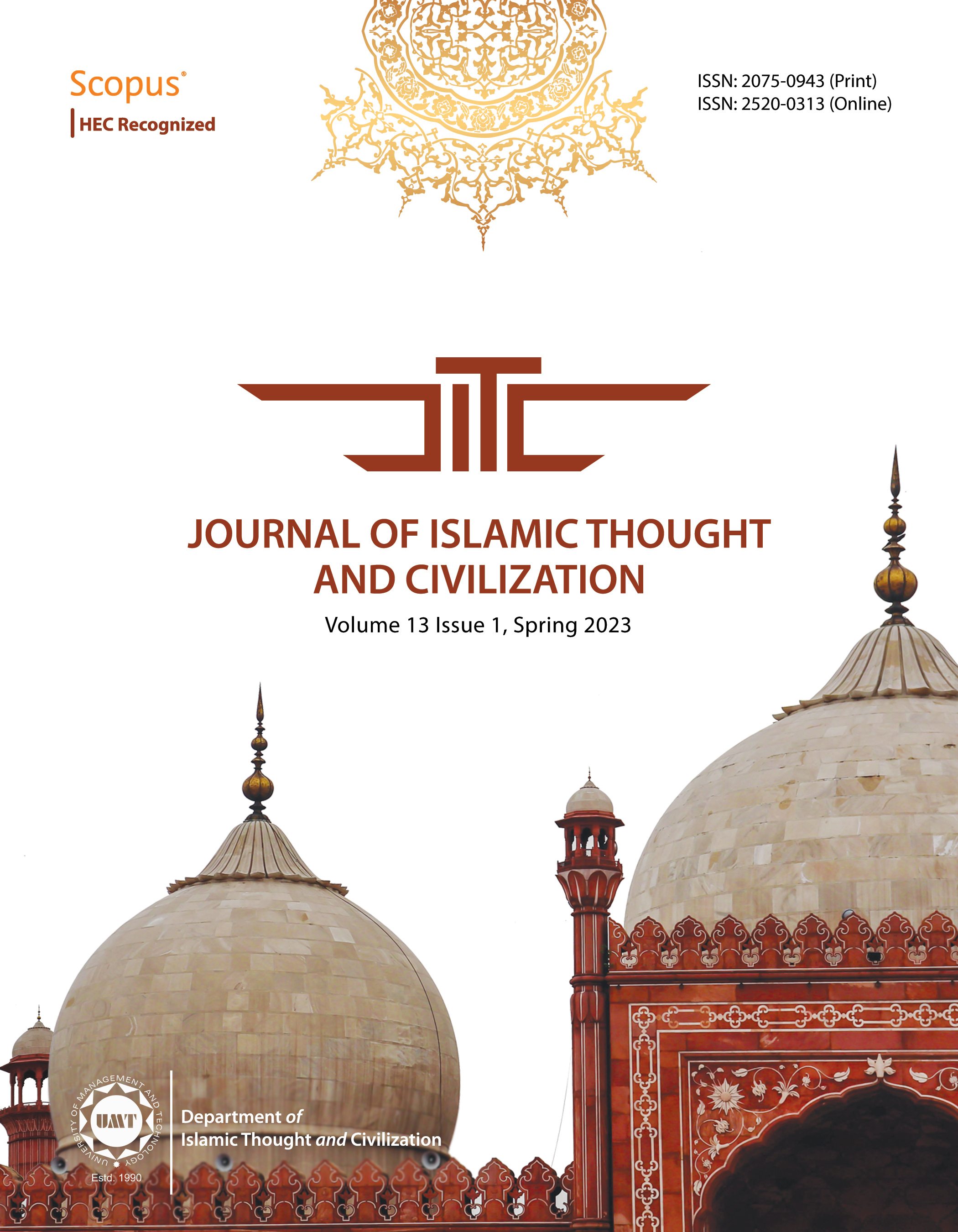Exploring Civilization: Analyzing Siraj Munir’s Conception of Islamic Civilization
Abstract
 Abstract Views: 60
Abstract Views: 60
The current study provides the contextual background of the multifaceted and ever-evolving concept of civilization, tracing its origins and evolution in the field of social sciences along with its use in the Islamic context as well as its application in the pre-partition Indian subcontinent. The focus remains on the perspectives of Pakistani scholars regarding the notion of Islamic civilization with a specific emphasis on the ideas of Siraj Munir. The author classified the diverse perspectives of Pakistani scholars into three distinct categories namely materialists, fundamentalists, and idealists. Siraj Munir's views are situated within the idealist category. Through an in-depth analysis, the author provides a comprehensive examination of Munir’s ideas regarding the definition, formation, components, evolution, differences, and rise and fall of civilizations, as well as his articulation of Islamic and Pakistani civilizations. The current study offers a nuanced and critical understanding of the concept of civilization, providing valuable insights for scholars and researchers in the field.
Downloads
References
Abdullah, Syed. Culture Ka Masla (The Issue of Culture). Lahore: Sang e Meel Publication, 2001.
Agha, Wazir, ed. “Culture Ka Masla. (The Issue of Culture)” In Tanqeed Aur Ehtisab (Critique and Accountability). Lahore: Jadeed Nashireen, n.d.
Haseeb, Jawaad., and Muhammad Riaz Mahmood. “Authorship and Research work on Islamic Civilization in Pakistan: A Study of Notable Trends.” Al-Qamar 4, no. 2 (2021): 219-234.
Hassan Askari, “Tareekhi Shaoor,” (Historical Consciousness). In Takhleeqi Amal aur Usloob (Creative Process and Manner). Karachi: Nafees Academy, 1989.
Hassan, Sibt. Pakistan Mein Tehzeeb Ka Irtiqa (Evolution of Civilization in Pakistan). Karachi: Maktaba-e-Daniyal, 1989.
Ibn Khaldūn. The Muqaddimah. Translated by Franz Rosenthal. Princeton: Princeton University Press, 1958.
Mazlish, Bruce. "Civilization in a Historical and Global Perspective." International Sociology 16, no. 3 (2001): 293-300. DOI: https://doi.org/10.1177/026858001016003003
—. “Introduction.” In Civilization and Its Contents, 5-12. Stanford, CA: Stanford University Press, 2004.
Moj, Muhammad. The Deoband Madrassah Movement: Countercultural Trends and Tendencies. London: Anthem Press, 2015.
Munir, Siraj. Maqalat e Siraj Munir (Writings of Siraj Munir). Karachi: Academy Bazyaft, 2010.
—. Millat e Islamiya: Tehzeeb o Taqdeer ((Islamic Nation: The civilization and the fate). Lahore: Idara e Saqafat e Islamiya, 1987.
Nasr, Seyyed Hossein. Islam and the Plight of Modern Man. Cambridge: Islamic Texts Society, 2002.
Philips, Cyril H., and Peter Hardy. “Modern Muslim Historical Writing on Medieval Muslim India.” In Historians of India, Pakistan and Ceylon. Edited by C. H. Philips and M. M. K. Lodhi. London: Oxford University Press, 1967.
Qureshi, Ishtiaq Husain. The Pakistani Way of Life. Saddar Karachi, Pakistan: Royal Book Co., 1988.
Scruton, Roger. The West and the Rest: Globalization and the Terrorist Threat. Wilmington, DE: Intercollegiate Studies Institute, 2003.
Sevea, Iqbal Singh. The Political Philosophy of Muhammad Iqbal. Cambridge: Cambridge University Press, 2012. DOI: https://doi.org/10.1017/CBO9780511920172
Copyright (c) 2023 Farid bin Masood, Muhammad Rasheed Arshad

This work is licensed under a Creative Commons Attribution 4.0 International License.

This work is licensed under a Creative Commons Attribution 4.0 International License. Authors retain copyright and grant the journal right of first publication with the work simultaneously licensed under a Creative Commons Attribution (CC-BY) 4.0 License that allows others to share the work with an acknowledgement of the work’s authorship and initial publication in this journal.








